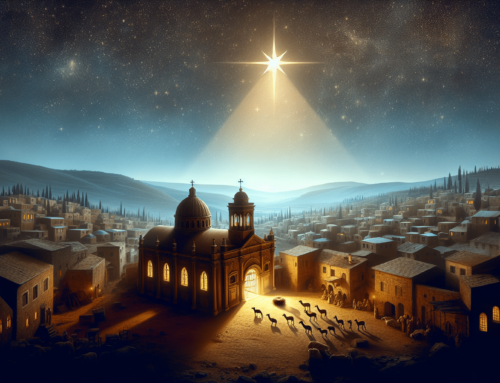Why Was December 25th Chosen As The Birthday Of Jesus?

If you’ve ever found yourself wrapped up in the cozy layers of the holiday season, you might have pondered why December 25th is marked as the birthday of Jesus. After all, it’s a date synonymous with festive cheer and family gatherings. Unraveling history’s tapestry, you’ll discover that the choice of December 25th is less about historical accuracy and more a blend of religious significance and cultural traditions that evolved over centuries. This captivating story takes you through a journey of ancient rituals, early Christian decisions, and the spread of Christianity — all of which played a role in aligning this special celebration with the winter calendar.
Historical Origins of the Date
Lack of evidence in biblical texts
You might be curious to know that despite the widespread acceptance of December 25th as the date of Jesus’ birth, the biblical texts do not provide clear evidence supporting this particular date. In fact, the Bible doesn’t specify a date for Jesus’ birth at all. This lack of a definitive date has led to much speculation and inquiry into why this date was chosen to celebrate such a significant event in the Christian calendar.
Winter solstice and the Roman calendar
Your interest in historical contexts brings you to explore the relationship between the date of December 25th and astronomical occurrences. The winter solstice, which occurs around December 21st to 22nd, was a crucial part of the Roman calendar. This period marked the shortest day and the longest night of the year, symbolizing the rebirth of the sun as days began to lengthen thereafter. This time was ripe for celebration and carried a sense of renewal and hope for the coming year.
The Feast of Saturnalia and its influence
As you delve deeper, you learn about the Feast of Saturnalia, a Roman festival honoring the god Saturn. Lasting about a week leading up to the winter solstice, Saturnalia was characterized by merriment, feasting, and a temporary suspension of social hierarchies. The resemblance of some Saturnalia customs to those of later Christmas celebrations suggests that this pagan festival may have influenced the way Christmas was celebrated when the date was eventually adopted by Christians.
Early Christian Traditions
Variations in the celebration of Jesus’ birth
Originally, you’ll notice that early Christians held various dates for Jesus’ birth. Some Eastern Christians, for instance, celebrated it on January 6th, a date that was also associated with the Epiphany, commemorating the visit of the Magi and Jesus’ baptism. This demonstrates that in the first few centuries after Jesus’ life, there was no consensus on a single date for his birth celebration.
The role of early church fathers
Turning your attention to the role played by early church fathers, you’ll find that their influence was instrumental in shaping the traditions of the Christian church. Theologians and church leaders like Clement of Alexandria, Tertullian, and later Hippolytus and John Chrysostom provided theological reasoning and helped establish certain feasts and celebrations, laying the groundwork for a more unified approach to the birth of Jesus.
The first recorded date of Christmas on December 25th
Your investigation uncovers that the first recorded mention of Christmas being celebrated on December 25th comes from a Roman almanac called the Philocalian Calendar, dating back to 354 AD. This date might have been selected for various reasons, which would become clear as you consider how Christianity related to pagan festivals, theological symbolism, and socio-political changes.
Pagan Festivals and Christianity
Co-option of pagan celebrations
You’ll discover an intriguing practice in the early Christian church of co-opting pagan festivals. As Christians sought to establish their religious holidays, they often chose dates that coincided with existing pagan celebrations. This strategic choice made the transition to Christianity smoother for converts and allowed the new faith to grow more organically within the Roman Empire.
The birth of Mithras and the Sol Invictus festival
Digging into the religious context of the time, you’ll learn about the Persian god Mithras, whose birth was celebrated on December 25th, aligning with the Roman feast of Sol Invictus (the Unconquered Sun). These festivals celebrated the victory of light over darkness, a theme that had a natural resonance with Christian theology.
Syncretism in the Roman Empire
During this era, the Roman Empire experienced a syncretism of religious beliefs, meaning that different religious traditions and practices began to blend together. This was a practical solution to the Empire’s diverse population and made the state religion more palatable to its various subjects, including Christians who were still a minority at this time.
Theological Rationales
Symbolism of light and birth in darkness
Your exploration reveals theological reasons behind choosing December 25th. The symbolism of light overcoming darkness, as the days begin to lengthen after the winter solstice, aligns perfectly with Jesus being seen as the ‘Light of the World’ entering into a period of spiritual darkness. Thus, celebrating His birth on December 25th was rich with metaphorical significance.
Calculation of date based on the Annunciation
As you delve into more complex calculations, you’ll find a theological rationale based on the date of the Annunciation, when the Angel Gabriel told Mary she would bear a son. Early Christians believed that the Annunciation and Jesus’ crucifixion fell on the same date, March 25th. Nine months after the Annunciation, which accounted for Jesus’ gestation, would place His birth on December 25th.
The concept of ‘perfect age’ and early Christian calculations
You’ll also learn about the concept of the ‘perfect age,’ which posited that great prophets were believed to have died on the same date they were conceived or born. This idea, combined with the idea that Jesus was to have lived a perfect life, led to calculated assumptions about his birth date that coincided with the previously established date of His death.
The Influence of Constantine
The establishment of Christmas as an official feast
The monumental contribution of Emperor Constantine to Christianity cannot be ignored by you. As the first Christian Roman Emperor, he officially established December 25th as the feast of Christmas, a significant step in the promotion and unification of the Christian tradition across the Roman Empire.
Unification of the Roman Empire under Christianity
Constantine’s reign was marked by efforts to unify the Roman Empire under a single religion, Christianity, which he helped to endorse through political and social support. His edict of toleration ended centuries of persecution and paved the way for Christianity to become the dominant religion of the Empire.
Constantine’s policies towards pagan practices
Your curiosity about how paganism fit into this new Christian framework will lead you to investigate Constantine’s policies. Although he facilitated the rise of Christianity, he did not abolish pagan practices altogether. Instead, he allowed a gradual blending, which included the transferral of some pagan rituals into Christian festivals.
Evolution of the Christmas Celebration
Changes in liturgical calendar
With the passage of time, you’ll observe the shifts in the liturgical calendar. As Christianity evolved, so did the date and observance of Christmas. Its placement in the calendar became a more integrated part of the Christian liturgical year, co-existing with other important celebrations such as Easter and Pentecost.
The spread of Christmas tradition across Europe
The threads of your historical tapestry lead you across Europe, where various customs and traditions emerged as Christmas spread. Every region adapted the celebration in unique ways, blending local customs with the core aspects of the feast, contributing to the rich and diverse ways Christmas is celebrated around the world today.
Adaptation by different Christian denominations
Your exploration leads you to the realization that the celebration of Christmas was adapted by different Christian denominations according to their particular theologies and customs. From the Roman Catholic Church to Eastern Orthodoxy and the Protestant branches, each tradition has left its own mark on how Christmas is understood and observed.
Scholarly Debates on the Date
Arguments against the December 25th date
Scholars, whom you might be following with great interest, have debated the authenticity of the December 25th date, citing historical, astronomical, and scriptural inconsistencies. Some argue that shepherds tending to their flocks as mentioned in the Bible would be unlikely during winter, suggesting a different time of year for Jesus’ birth.
Alternative theories on Jesus’ birth
In your search for truth, you encounter alternative theories regarding the date of Jesus’ birth. Some scholars point to early Jewish text interpretations, pastoral cycles, and climate data to propose dates in either spring or autumn.
Archaeological and historical perspectives
Taking into account archaeological and historical perspectives, you learn that evidence from the time of Jesus’ birth is scarce. Consequently, these disciplines provide limited direct insight into the exact date of Jesus’ birth, leaving much to interpretation and scholarly conjecture.
Modern Perspectives on December 25th
Secular versus religious celebration
Today, you are likely to perceive a dichotomy between the secular and religious celebration of Christmas. December 25th is not only a time for religious observance but also a widely embraced cultural phenomenon, complete with its own secular traditions such as gift-giving, festive decorations, and the figure of Santa Claus.
Impact of commercialization on Christmas
You can’t help but notice the impact of commercialization on the celebration of Christmas. The economic implications have grown, transforming parts of the holiday into a consumer-driven period where the spiritual and religious significance may sometimes take a backseat to shopping and sales.
Global variations in Christmas traditions
Your global outlook would not be complete without acknowledging the remarkable variations in Christmas traditions around the world. In some countries, Christmas is a public holiday with widespread celebration, while in others, it is observed only by Christian communities with specific localized customs.
Comparative Religious Context
December 25th in different religious calendars
You recognize that December 25th holds different places in various religious calendars. While it is a major celebration in the Christian calendar, other faith traditions may have their own significant holidays around the same time, including Hanukkah in Judaism and various cultural festivals like Kwanzaa.
Interfaith views on the birth of Jesus
Your exploration reveals an openness in interfaith dialogues where the birth of Jesus is acknowledged with respect by different faiths. Though the significance of this event may vary from one religion to another, many recognize its profound impact on the world.
Historical figures and December 25th
You take note that December 25th is also the date associated with historical figures apart from Jesus, contributing to a wider cultural tapestry. The likes of Sir Isaac Newton were also born on this date, adding another layer of meaning to the day from a broader historical perspective.
Did the choice of December 25th as Jesus’s birthday have any influence on countries that celebrate Christmas on the 24th?
The choice of December 25th as Jesus’s birthday did not have any influence on countries that celebrate Christmas on the 24th. The tradition of christmas celebrations on 24th is rooted in various cultural and religious practices and is not directly related to the date chosen for Jesus’s birth.
Controversies and Criticisms
Puritan opposition to Christmas celebrations
It might surprise you to learn about the Puritan opposition to Christmas celebrations in history. The Puritans, with their emphasis on simplicity and biblical authority, viewed the traditional observance of Christmas with its pageantry and pagan roots as inconsistent with Christian faith.
Modern-day concerns over accuracy and commercialism
You are well aware of modern-day concerns around Christmas. Discussions often center on the accuracy of December 25th as Jesus’ birth date, as well as the overwhelming commercialism that can overshadow the holiday’s religious significance.
Debates on the true date of Jesus’ birth
Finally, as you reflect on the discussions, you realize that the debates on the true date of Jesus’ birth continue to draw interest, whether within scholarly circles, among the faithful, or in broader cultural conversations. The mix of historical evidence, theological interpretation, and tradition means that December 25th remains both a fixture and a topic of lively discussion.


